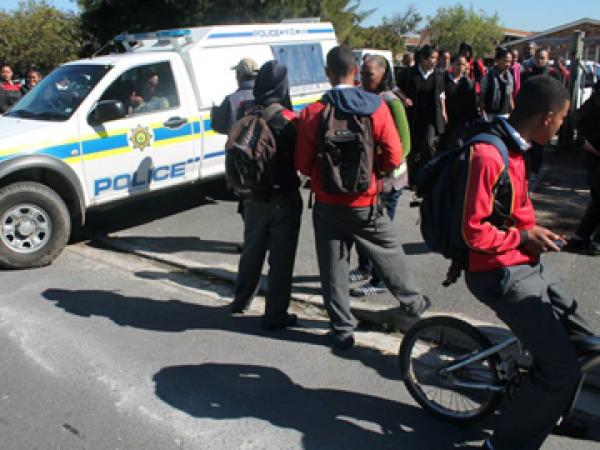Manenberg schools battle for safety

Lesley Knight has been teaching at Edendale Primary School for 27 years. She has witnessed some of the worst incidents of gang violence in Manenberg.
“How can you teach or learn in these conditions? You’re constantly frightened and unsure of what might happen next”, says Knight. The school, which serves 400 pupils, is one of five schools that have experienced the recent spate of gang violence in Manenberg.
Last week Friday, the Cape Town High Court granted an interim order compelling the Western Cape Education Department to provide adequate security for teachers and learners at Edendale Primary and four other schools in Manenberg. The order comes after the Manenberg Teachers’ Steering Committee, represented by the Equal Education Law Centre, filed an urgent application to secure the safety of learners and teachers at the five schools.
In the founding affidavit submitted to the Cape Town High Court, Eugene Peters (Acting Principal of Red River Primary School) noted with disappointment at the unresponsiveness of the WCED. The Manenberg Teachers’ Steering committee sent a letter of demand to the District Director of the Metro Education District, the HOD of Education and the MEC.
They received no response.
The interim court order has come at an appropriate time for teachers like Knight and Peters. The five schools – Edendale Primary, Silverstream Secondary, Rio Grande Primary and Sonderend Primary School – are located in the middle of the gang turf war between the Hard Livings and Americans gangs. Gang violence often brings the community to a virtual standstill, traumatizing both the learners and teachers.
After days of intense gang violence, the WCED refused to grant leave to the teachers at the affected schools.
“The WCED says the school principal cannot arbitrarily release us from our duties, even when we’re in distress,” says Knight.
On Sunday 24 February, the South African Police Service (SAPS) tabled a two-week safety plan for the five affected schools. The plan – which took effect yesterday – provides for the deployment of additional stationary police vehicles at the schools and increased police patrols.
“There was a strange calmness today. Many of the parents were hesitant to bring their kids to school. But some did, even though the kids arrived late. We felt safe,” says Knight.
According to the plan, the SAPS are required to patrol the area around the school from 7am to 9am and from 1pm to 3pm daily.
But the plan is a temporary relief to a long-standing problem in the community. “The gang wars have their own dynamics. The problem is historical and we have not seen a firm solution to it,” says Knight.
In a statement issued yesterday, the Equal Education Law Centre noted it’s disappointment at the insistence by the WCED that it is not the party that is primarily responsible for protecting learners and teachers on schools premises.
Sherylle Dass, an attorney at the Equal Education Law Centre, says that although the WCED cannot address the gang violence alone in the Manenberg schools, it needs to play a leading role.
Dass wrote: “In the view of the EELC, and as suggested by the High Court judgment, the WCED should take a leading role in prioritising and convening an effort to do so [provide safety].”
In a email response to GroundUp, Bronagh Cassey (Spokesperson for the WCED) said that in addition to the safety plan tabled by the SAPS, the WCED is also constructing and repairing fences at each of the 14 Manenberg schools in addition to the work done through the Safe Schools programme.
Responding to concerns on teaching and learning, Cassey wrote, “The WCED will also ensure that catch-up programmes will be arranged for any loss of teaching time … It is standard practice for the WCED to ensure that these catch-up programmes are arranged and additional support given.”
In her State of the Province Address this past Friday, Premier Helen Zille called on President Zuma and Police Minister, Nathi Mthethwa, to take action. Zille also called for the reinstatement of the special gang unit.
Zille said: “We believe the re-establishment of this unit is critical if we want to rid our communities of gangs and the violent crime and scourge of drugs associated with them.”
In its recommendations on building safer communities, the National Development Plan suggests that urgent security matters should be escalated to the Member of the Executive Committee for Education (MEC) and the Premier.
The NDP recommends that the Premier should table a report to the Provincial Coordinating Committee (PCC) on matters relating to safety of learners, including the nature or lack of infrastructure at schools. This report should be open to the public and allow for public comment.
It is unclear what the prospects are for the Manenberg learners and teachers. For now, increased police presence seems to be their only relief. “We do not want armed guards in our schools. We feel caged. But given the situation, they’re our only hope,” says Knight.
Update
This afternoon (25 February), Judge Yekiso reconsidered Friday’s ruling and rescinded it. SAPS will however continue to stand outside the schools for the next two weeks.
Support independent journalism
Donate using Payfast

Don't miss out on the latest news
We respect your privacy, and promise we won't spam you.
Next: Back to the land: an interview with Constance Mogale
Previous: Battle against Uganda’s anti-homosexual law is not over

This article is licensed under a Creative Commons Attribution-NoDerivatives 4.0 International License.
